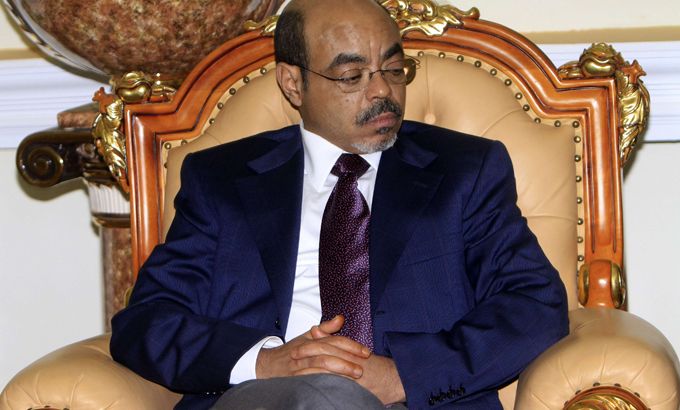Obituary: Ethiopian PM Meles Zenawi
The PM dies after battling an unknown illness for two months. Here is a look at his rise to power.

Meles Zenawi was a young rebel when he became Ethiopia’s leader after the fall of Colonel Mengistu Haile Mariam in 1991.
He died abroad at the age of 57 following a battle with an unknown illness for two months.
Born on May 8, 1955, Zenawi abandoned his medical studies before he turned 20 to join the rebel Tigray People’s Liberation Front (TPLF) to fight Mengistu.
Zenawi was born Legesse Zenawi in Adwa, the site of Ethiopia’s most celebrated victory against Italian invaders in 1896.
He took the nom-de-guerre Meles as a tribute to Meles Tekle, a young activist killed by the government.
When Mengistu announced the start of his Red Terror purges in 1977, Zenawi was already in the bush and a rising figure in the TPLF that he helped found as a 20-year-old.
After taking over the TPLF’s leadership he forged a broader coalition with other regional movements to make up the Ethiopian People’s Revolutionary Democratic Front (EPRDF), now the country’s ruling party.
Toppled dictatorship
With US backing, the rebellion toppled Mengistu’s dictatorship in 1991, a year after Zenawi abandoned Marxism.
Zenawi, who earned degrees in business from Britain’s Open University and in economics from Erasmus University in the Netherlands, used to list his hobbies as reading, swimming and tennis.
Zenawi was married to a former Tigray rebel fighter Azeb Mesfin, a member of parliament, women’s activist and businesswoman, with whom he had three daughters and one son.
“They were this army of kids in shorts with huge afros, marching into the city,” an Addis resident told the Reuters news agency.
“We didn’t even know who Meles Zenawi was.”
Ethiopians soon got to know the 35-year-old intimately when he took power, first as transitional president and later, after poorly contested elections in 1995, as prime minister of the renamed Federal Democratic Republic of Ethiopia.
The EPRDF set about trying to change the desperately poor country, pledging to drive growth and improve the lives of peasant farmers. It introduced a system of ethnic federalism, opening regional parliaments and giving Ethiopia’s main ethnic groups the chance to govern the areas in which they dominate.
The West welcomed Africa’s new youngest leader enthusiastically, grateful for his overthrow of a communist regime and impressed with his savvy ways.
Bill Clinton, the former US president, described Zenawi as part of a “new generation” of African leaders and he was invited to join then British Prime Minister Tony Blair’s crusading Commission for Africa.
But Zenawi’s record of solid economic growth, poverty reduction and closer ties to the West was marred by a crackdown on dissent, rights groups say.
‘Cult of the personality’
Shortly after Ethiopia fought a bitter war with neighbouring Eritrea, a country that gained independence from Ethiopia once Mengistu had fallen.
The war bred divisions within the TPLF central committee that soon spilled over into arguments about economic policy.
That row ended with 12 of the TPLF central committee expelled and some, including former defence minister Seye Abraha, ended up in prison on corruption charges.
The 2005 national election, seen as the first poll that could be truly democratic, saw the rise of the ad-hoc Coalition for Unity and Democracy (CUD).
When the EPRDF claimed victory, the CUD cried fraud, street riots erupted and 193 protesters and seven policemen died.
The CUD leaders were imprisoned.
Under pressure from Western donors, Zenawi has refused to back down and said Ethiopia could survive without them if it had to.
Somalia invastion
Zenawi also invaded longtime Ethiopian foe Somalia, sending troops and tanks to topple an Islamist regime in 2006, before pulling out the following year in the face of guerrilla attacks.
He sent Ethiopian troops back into Somalia in 2011.
While Zenawi was regularly singled out by rights groups as one of the continent’s worst human-rights violaters, some Western observers took the pragmatic view that Ethiopia and the region needed Zenawi where he was.
Unlike many of his fellow African leaders Zenawi never earned a reputation for having a taste for luxury.
In the final decade of his life he challenged the world’s powerful and spearheaded an African push for more fairness in key climate change talks.
Speculation that Zenawi was seriously ill grew after he failed to attend an African Union summit in the Ethiopian capital, Addis Ababa, last month.
Diplomats in Addis Ababa had said he was being treated in Brussels for an undisclosed illness, while others said he was in Germany.
Ethiopia’s government said last month that he was taking a break to recover from an unspecified condition.